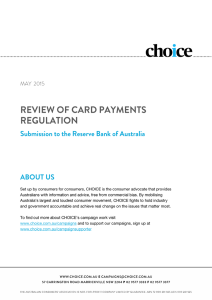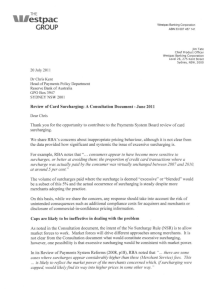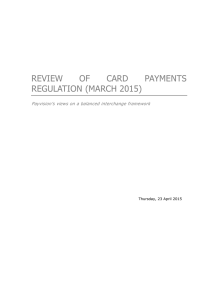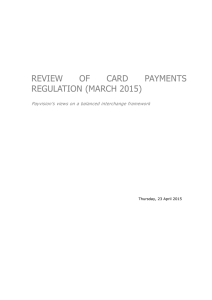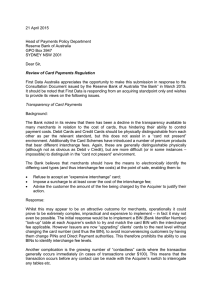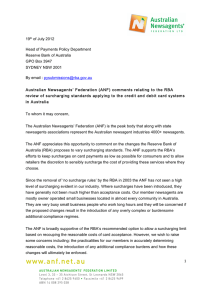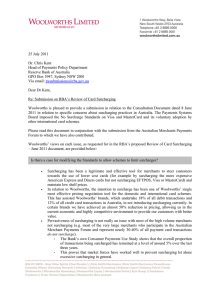Addressing Excessive Merchant Surcharging on Payment Cards Submission to the
advertisement
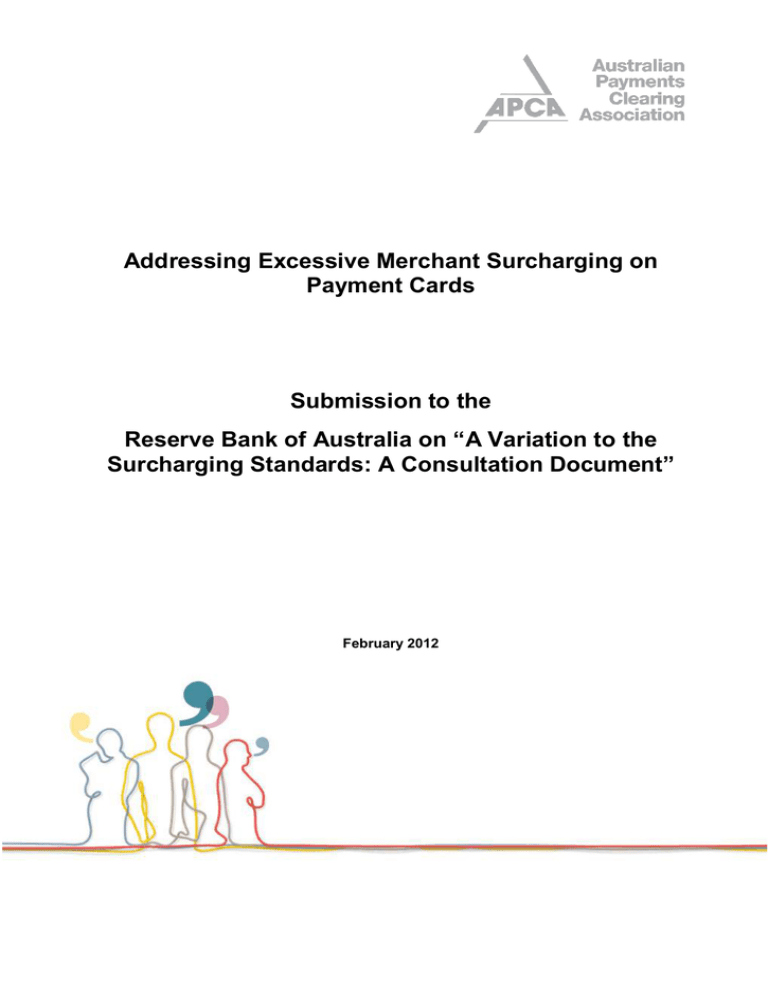
Addressing Excessive Merchant Surcharging on Payment Cards Submission to the Reserve Bank of Australia on “A Variation to the Surcharging Standards: A Consultation Document” February 2012 Addressing Excessive Merchant Surcharging on Payment Cards Australian Payments Clearing Association About this document This is the submission of the Australian Payments Clearing Association to the Reserve Bank of Australia on A Variation of the Surcharging Standards: A Consultation Document, issued in December 2011. Contact: Dr Brad Pragnell Head of Industry Policy Australian Payments Clearing Association Limited Email: bpragnell@apca.com.au Level 6, 14 Martin Place Sydney NSW 2000 Tel: +61 2 9221 8944 Fax: +61 2 9221 8057 Publication The Association has no objection to publication of its submission. Information in this document is subject to change without notice. No part of it may be copied, reproduced, translated, or reduced to any electronic medium or machinereadable form without prior written permission from Australian Payments Clearing Association Limited. Written and published in Sydney, Australia by Australian Payments Clearing Association Limited. Copyright 2012 Australian Payments Clearing Association Limited. ABN 12 055 136 519. All Rights Reserved. February 2012 ii Addressing Excessive Merchant Surcharging on Payment Cards Australian Payments Clearing Association Table of Contents 1. Introduction ......................................................................................... 1 2. The Proposed Variation to the Standard ........................................... 1 3. Related Issues..................................................................................... 2 4. Conclusion .......................................................................................... 3 February 2012 iii Addressing Excessive Merchant Surcharging on Payment Cards 1. Australian Payments Clearing Association Introduction The Australian Payments Clearing Association Limited (APCA) is pleased to make this submission to the Reserve Bank of Australia (RBA) on A Variation of the Surcharging Standards: A Consultation Document, issued in December 2011. APCA maintains a strong preference for market-based outcomes. However, if regulation is required to ensure competition, efficiency and security, then industry self-regulation is preferred. We acknowledge that permitting merchant surcharging on credit and debit cards has been essentially pro-competitive and, as such, a positive regulatory intervention. Permitting merchant surcharging enables price signalling to consumers, facilities merchants in their negotiations on merchant service fees and allows merchants to recover the costs associated with card acceptance. APCA strongly believes price capping of merchant surcharging and interchange fees distorts markets and inhibit efficient outcomes. Ideally, market and self-regulatory based solutions or existing legislation should be explored before consideration of a new price capping response to address excessive surcharging. We do acknowledge, however, that the practice of excessive surcharging may require some regulatory attention. The RBA has made its position clear on the need to modify the card standards. APCA’s comments in this submission are premised on the proposed RBA approach being the basis for reform. 2. The Proposed Variation to the Standard Data from the RBA and provided by stakeholders in submissions to the June 2011 Merchant Surcharging Consultation Paper suggests that excessive surcharging remains concentrated within particular industries and payment channels (for instance, online purchasing of discount airline tickets). Indeed, the RBA’s own research suggests that the consumer experience of surcharging has remained reasonably consistent over recent years and that, for most of their card transactions, consumers do not pay a surcharge. The overall soundness of a policy to permit surcharging and the confined nature of excessive surcharging suggests a major reworking or reversal of the overall policy approach or a heavyhanded intervention would not be appropriate. A “light touch”, self-regulatory solution appears far more appropriate. APCA therefore welcomes the RBA not pursuing some of the more interventionist and burdensome proposals made in the June 2011 consultation paper. These include the disclosure of the merchant service fee at point of sale and a fixed cap on surcharges. Basing the surcharge limits on the reasonable costs of acceptance has the potential for fewer unintended consequences and adverse market outcomes than a fixed cap. The implementation of surcharging limits will need to be resolved in close consultation with all stakeholders. Ensuring implementation and compliance costs remain low and the balancing of competing interests and incentives for cardholders, issuers, schemes, merchants and acquirers will be critical as further decisions are made on definitions of reasonable costs of acceptance, commencement dates and regulator expectations for monitoring by acquirers. Defining the reasonable cost of acceptance is one of the more challenging aspects of the proposal and the use of the scheme rules may not be the only option. The December 2011 consultation document leaves open the question of who will ultimately decide what constitutes reasonable costs beyond the merchant service fee. February 2012 1 Addressing Excessive Merchant Surcharging on Payment Cards Australian Payments Clearing Association There remains the possibility that reasonable costs could be defined in an overtly narrow way, for example, if merchants are unable to include fraud related costs, including charge backs, as part of their reasonable costs. This would severely limit the ability of online merchants to surcharge, thus raising the likely use of cards online but shifting those costs back onto the merchants. Further, the defining of reasonable costs should not lead to imposition of a burdensome compliance regime, for instance, imposition of an audit process that would require acquirers to monitor surcharging practice or costs of all merchants. If merchants and their acquirers have a significant role in defining reasonable costs, there is the greater likelihood that the definition will be determined in a commercial environment and interpreted in a flexible fashion that is accommodating of differences between merchants. This approach also recognises that the merchant service fee, an essential component of reasonable costs, is confidentially agreed to between the acquirer and the merchant and is information that the schemes are not ordinarily privy to. The challenge with this approach is achieving an outcome that provides a consistent approach without imposing expensive compliance requirements on acquirers and merchants, such as cost surveys. 3. Related Issues 3.1 Comprehensive Self-Regulation As noted in the earlier APCA submission, the RBA’s reliance on the card schemes’ rules to affect the surcharge caps is not ideal. However in the absence of other alternatives, we recognise that this represents a more pragmatic, flexible and self-regulatory approach than direct regulatory intervention by a regulator. The issue of how to regulate merchant surcharging suggests that limitations remain in relation to regulating particular system-wide practices. In our submission on Systemic Governance to the RBA Innovation Review, APCA proposed that: A single, comprehensive industry self-governance body should be established to work with the public regulator. The body should have clearly defined self-regulatory authority, supported by changes to the PSRA to develop, implement and ensure compliance with industry self-regulation, under well-defined RBA oversight. A more robust and inclusive self-regulatory regime, along the lines proposed above, may provide the RBA and industry stakeholders with another, and possibly more appropriate and effective, means for addressing future cross-scheme issues. 3.2 Surcharging of Other Payment Instruments As noted in our previous submission, despite the rise of card surcharging, to the best of our knowledge, surcharging of other payment instruments remains almost non-existent in Australia. We believe the RBA interventions on the lifting of the “no surcharge” standards sent a clear signal to merchants that card surcharging was acceptable. Until the recent comments on the surcharging of cheques as part of the APCA’s consultation on the future of cheques, the RBA has been relatively silent on the appropriateness of surcharging other payment instruments. This absence of clear and comprehensive regulatory signals on the acceptability of surcharging other payment instruments has likely meant merchants have been hesitant to explore this path. This on-going uncertainty constrains the ability of merchants to recoup costs associated with nonFebruary 2012 2 Addressing Excessive Merchant Surcharging on Payment Cards Australian Payments Clearing Association card payments, potentially creating cross-subsidies (card users subsidising cash and cheque users) or else disposing merchants to promote cards, on which they can surcharge, at the expense of other options. An unintended consequence of card surcharging is that it drives consumers to cash at point of sale, which is often costly and inefficient. Given the RBA’s objective for payments efficiency, there should be clarity on the ability of merchants to surcharge both card and non-card payment instruments to recoup acceptance costs and to effect more robust payment instrument competition. This includes the ability of merchants to differentially surcharge across schemes. Ideally this clarity should not advantage or disadvantage particular instruments. 4. Conclusion APCA welcomes the opportunity to consult on the RBA’s A Variation of the Surcharging Standards: A Consultation Document, issued in December 2011. APCA acknowledges that permitting merchant surcharging on credit and debit cards has been essentially pro-competitive and, as such, a positive regulatory intervention. APCA also recognises that “excessive surcharging” needs to be addressed. APCA welcomes the RBA’s move away from previous, more interventionist proposals such as the disclosure of merchant service fees at point of sale and the application of a fixed surcharge cap. Though addressing “excessive surcharging” through the card scheme rules is not ideal, APCA recognises it is a pragmatic, flexible and self-regulatory solution. A more robust self-regulatory framework, along the lines proposed by APCA in our governance submission to the RBA Innovation Review, could provide the RBA with another alternative to address policy issues such as this in the future. APCA notes the importance of consulting with other stakeholders on implementation of the new surcharge capping regime. This includes minimising the compliance requirement on acquirers and ensuring the means for the establishment of “reasonable costs” is not interpreted in an overtly narrow fashion. The need for clarity on the ability of merchants to surcharge payments instruments other than cards is also needed. February 2012 3
